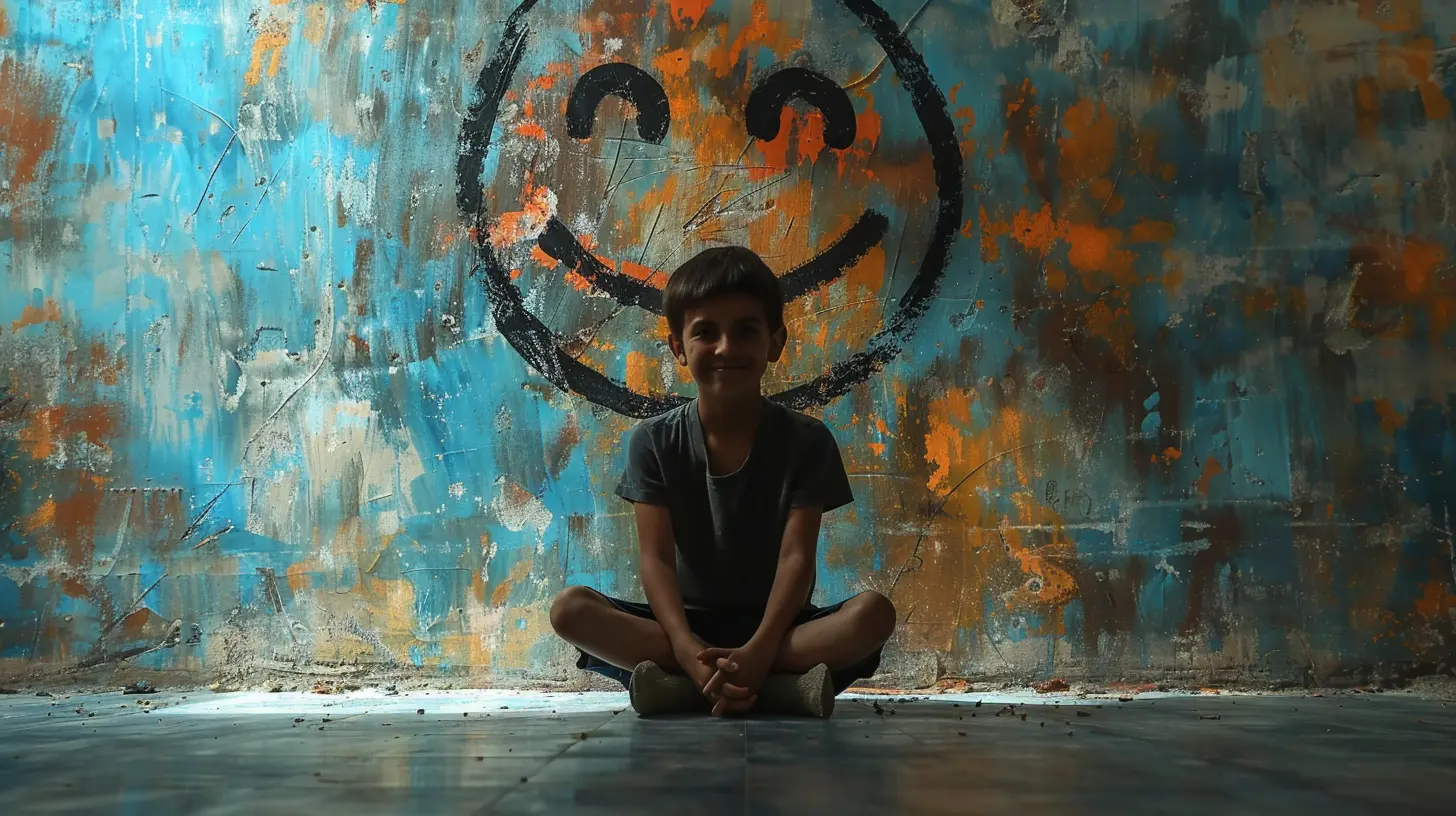The Impact of Childhood Experiences on Adult Emotional Growth
9 March 2025
Have you ever wondered why some people seem to navigate the ups and downs of life effortlessly while others struggle with emotional challenges? You might think it's just luck or personality, but research suggests that a significant part of how we handle emotional situations as adults stems from something much deeper—our childhood experiences.
In fact, childhood is like the foundation of a house. If that foundation is strong and sturdy, it can support a healthy, well-rounded adult life. But if there are cracks or weaknesses, those may show up later down the line, affecting how we manage our emotions, relationships, and overall mental health. So, let’s dive in and explore how the events and environment we grow up in can shape our emotional growth as adults.

Why Childhood Experiences Matter
We often hear the phrase "children are like sponges," absorbing everything around them. As children, we are highly impressionable, and the experiences we go through—both good and bad—can leave lasting marks on us. These experiences form the blueprint for how we see the world, how we interact with others, and most importantly, how we handle our own emotions.But why does this happen? Well, during childhood, our brains are still developing. Neural pathways are being formed, and the emotional templates we build during these formative years often stay with us into adulthood. A warm, nurturing environment can encourage healthy emotional growth. Meanwhile, a chaotic or neglectful upbringing could create emotional hurdles that are harder to overcome later in life.
The Role of Attachment
One of the most critical aspects of childhood emotional development is the concept of attachment. This is the emotional bond that forms between a child and their primary caregiver, typically a parent. Psychologist John Bowlby first introduced the idea of attachment theory, and it has since become a cornerstone in understanding how relationships and emotions develop throughout life.- Secure Attachment: If a child grows up feeling safe, loved, and emotionally supported, they are more likely to develop a secure attachment. This means they will probably have healthier relationships and emotional resilience as adults.
- Insecure Attachment: On the flip side, if a child experiences neglect, inconsistency, or trauma, they may develop an insecure attachment style. This might lead to issues like fear of abandonment, trust issues, or difficulty regulating emotions as they grow older.
Simply put, the emotional bond we form with our caregivers acts as a kind of “emotional blueprint” for how we navigate relationships and emotional challenges in adulthood.

Types of Childhood Experiences That Affect Emotional Growth
Not all childhood experiences are created equal. Some have a more profound and long-lasting impact than others. Let's break down a few key types of childhood experiences that can influence adult emotional growth:1. Trauma and Adverse Childhood Experiences (ACEs)
Trauma isn’t something that only happens in a war zone or after a terrible accident. For many children, trauma comes in the form of adverse childhood experiences (ACEs), a term that includes situations like abuse, neglect, or household dysfunction. These experiences can have a ripple effect on emotional well-being throughout life.Research shows that people who have a high number of ACEs are more likely to struggle with mental health issues, such as anxiety, depression, and even physical health problems like heart disease. ACEs can make it harder for individuals to form healthy relationships, regulate emotions, and manage stress.
2. Parental Influence and Modeling
Ever catch yourself saying something your parents used to say, whether you intended to or not? That’s because children often learn by observing the world around them, and parents are usually their first and most influential teachers. Whether parents handle stress by bottling it up, lashing out, or talking things through calmly, kids take notes and often mimic these behaviors.If your parents were emotionally available and encouraged open communication, you’re likely to carry those healthy habits into adulthood. Conversely, if your parents were emotionally distant or volatile, you might find yourself struggling to form emotional connections or manage your feelings.
3. Neglect and Emotional Invalidation
Neglect doesn’t always refer to a lack of food or shelter. Emotional neglect can be just as damaging, if not more so. If a child’s emotions are consistently dismissed or ignored, they can grow up feeling like their feelings don’t matter. This emotional invalidation can stifle emotional growth, leading to issues with self-esteem, trust, and emotional regulation in adulthood.Imagine trying to learn how to ride a bike, but every time you fall, someone tells you it’s no big deal, or worse, that you’re overreacting. Eventually, you’d stop trying, right? The same thing happens emotionally when a child’s feelings are constantly downplayed or ignored.
4. Supportive and Nurturing Environments
On the flip side, a supportive and caring environment can significantly boost emotional development. When children are encouraged to express themselves, and their feelings are met with empathy and understanding, they often grow up to be emotionally intelligent adults. They learn that emotions are not something to be feared or suppressed but rather understood and navigated.In nurturing environments, children develop a sense of emotional safety, which allows them to take risks, trust others, and form healthy relationships. This emotional "muscle" built during childhood often helps them bounce back from hardships and manage stress more effectively as adults.

How Childhood Experiences Shape Adult Emotional Growth
So, how exactly do childhood experiences translate into adult emotional behaviors? Let’s look at a few ways these early experiences can manifest later in life:1. Emotional Regulation
Children who grow up in environments where emotions are acknowledged and addressed tend to be better at regulating their feelings as adults. This means they’re less likely to fly off the handle when something goes wrong or spiral into despair when faced with a challenge. They’ve learned the critical skill of emotional regulation, which is essentially the ability to manage and respond to emotional experiences in a healthy way.On the other hand, children who grow up in chaotic or emotionally unpredictable environments may struggle with emotional regulation. They might find it difficult to calm down when stressed or have trouble expressing their feelings in healthy ways.
2. Relationship Patterns
Our early relationships, particularly with our caregivers, often set the stage for how we interact with others later in life. If you experienced a secure attachment in childhood, you’re more likely to form healthy, trusting relationships as an adult. You’ll likely have an easier time establishing emotional intimacy and trusting others.In contrast, if you experienced insecure attachment, you might struggle with relationships. You could either become overly dependent on others (anxious attachment) or keep people at a distance (avoidant attachment). Both of these patterns can prevent you from forming deep, meaningful connections.
3. Self-Worth and Confidence
The way we are treated as children can significantly impact our sense of self-worth and confidence as adults. If your caregivers consistently praised your efforts and supported your endeavors, you likely developed a strong sense of self-worth. You believe in your abilities and feel confident tackling new challenges.However, if you were constantly criticized or ignored, you may grow up with low self-esteem, doubting your value and abilities. This lack of confidence can hold you back from pursuing your goals and forming healthy relationships.
4. Coping Mechanisms
Think back to how your family dealt with problems. Did they scream and shout, or did they sit down and talk things through? The coping mechanisms you saw in childhood often become your default strategies for dealing with stress as an adult.If you grew up in a household where conflict was resolved in a healthy, constructive way, you’re more likely to have developed good coping skills. You’ll probably handle stress by seeking solutions and reaching out for support. On the other hand, if conflict in your home was handled poorly, you might find yourself shutting down or exploding when things get tough.

Can You Overcome Negative Childhood Experiences?
Now, if you’re reading this and thinking, “Wow, my childhood wasn’t exactly a picnic,” don’t lose hope. The beauty of human emotional growth is that it’s ongoing. While childhood experiences can have a lasting impact, they don’t have to define you forever. With effort, it’s possible to unlearn unhealthy emotional patterns and develop new, healthier ones.1. Therapy and Counseling
Talking to a therapist can be incredibly beneficial if you’re struggling with emotional issues rooted in childhood. Cognitive-behavioral therapy (CBT), for example, is particularly effective at helping people identify and change negative thought patterns that may stem from early experiences.2. Building Emotional Intelligence
You can also work on developing your emotional intelligence, which is the ability to recognize, understand, and manage your emotions. This involves practicing mindfulness, improving communication skills, and learning how to empathize with others.3. Healthy Relationships
Surrounding yourself with supportive and emotionally intelligent people can also help you heal from negative childhood experiences. Healthy relationships can provide a corrective emotional experience, teaching you new ways of relating to others and managing your emotions.Final Thoughts
Our childhood experiences undeniably play a significant role in shaping who we become as adults. They can either set us up for emotional success or leave us with challenges to overcome. But remember, while we can’t change the past, we do have the power to shape our future. By understanding how our childhood impacts us and taking steps to foster emotional growth, we can build a happier, healthier life.all images in this post were generated using AI tools
Category:
Emotional GrowthAuthor:

Gloria McVicar
Discussion
rate this article
7 comments
Lyla Montgomery
Thank you for this insightful article. It beautifully highlights how our childhood experiences shape our emotional development. Understanding these connections can lead to greater self-awareness and healing. I appreciate the valuable perspectives shared here; they resonate deeply with me.
March 30, 2025 at 4:47 PM

Gloria McVicar
Thank you for your kind words! I'm glad the article resonated with you and sparked important reflections on emotional growth.
Eva McIlroy
Childhood shapes us fundamentally—it's not just a phase but a foundation. Acknowledge your past, embrace it, and harness its lessons. Growth demands honesty; don’t shy away from facing your emotional roots.
March 27, 2025 at 4:38 PM

Gloria McVicar
Thank you for your insightful comment! You’re absolutely right—embracing our childhood experiences is crucial for true emotional growth. Acknowledging our roots allows us to understand ourselves better and fosters genuine healing.
Violet McDermott
Childhood experiences profoundly shape adult emotional development and resilience.
March 18, 2025 at 3:47 PM

Gloria McVicar
Absolutely! Childhood experiences lay the foundation for emotional health, influencing how we cope and grow in adulthood.
Vito Powell
Ah, childhood! The whimsical garden where emotions sprout like wildflowers. Who knew that a lopsided swing set and a pet goldfish could hold the key to adult emotional growth? Here’s to navigating the surreal maze of memories—bring on the wacky therapy session!
March 17, 2025 at 5:37 PM

Gloria McVicar
Thank you for your poetic reflection! Childhood truly is a rich tapestry that shapes our adult selves in unexpected ways.
Zevon McTigue
This article insightfully highlights how formative childhood experiences shape adult emotional resilience and interpersonal relationships, emphasizing the importance of early intervention.
March 16, 2025 at 4:09 PM

Gloria McVicar
Thank you for your thoughtful comment! I'm glad you found the article's insights on childhood experiences and their lasting impact on emotional resilience valuable.
Maribel McKee
Childhood experiences shape our emotional landscape, but they don’t define our future. Embrace your journey of growth and healing, recognizing that every step taken today can lead to a brighter, more resilient tomorrow. You have the power to transform!
March 13, 2025 at 4:33 AM

Gloria McVicar
Thank you for your insightful comment! I completely agree—while childhood experiences influence us, our capacity for growth and healing is what truly shapes our future.
Echo Parker
Great insights! It’s fascinating how our childhood shapes us, but remember, it’s never too late to grow and heal. Embrace your journey and keep nurturing that emotional garden—beautiful blooms await at any age! 🌼✨
March 9, 2025 at 5:20 AM

Gloria McVicar
Thank you for your thoughtful comment! I completely agree—it's inspiring how growth and healing can happen at any stage in life. 🌱✨
MORE POSTS

Understanding the Stigma: Why Mental Illness Is Still Misunderstood

The Power of Mindfulness in Reducing Stress

How to Use Visualization Techniques to Relieve Stress

Building Mental Toughness: Strategies for Developing Resilience

How Childhood Experiences Shape Your Ability to Be Resilient

The Connection Between Emotional Growth and Mental Health